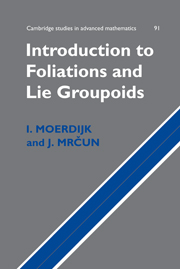2 - Holonomy and stability
Published online by Cambridge University Press: 02 February 2010
Summary
In this chapter, we will present the stability theorems for foliations, which were proved by Ehresmann and Reeb when the theory of foliated manifolds was first developed in the 1950s. These theorems express that, under certain conditions, all the leaves near a given leaf look identical. Central to these theorems is the notion of holonomy. The basic idea of holonomy goes back to Poincaré, in his study of the ‘first return’ map of vector fields. For a given point x on a manifold equipped with a foliation of codimension q, one may consider how the leaves near that point intersect a small q-dimensional disk which is transversal to the leaves and contains the given point. The ways in which these leaves depart from this disk and return to it are encoded in a group, called the holonomy group at x. It is a quotient group of the fundamental group of the leaf through x. This group contains a lot of information about the structure of the foliation around the leaf through x, especially if that leaf is compact. For example, if this group is finite then all the nearby leaves must also be compact, and the foliation locally looks like one which is obtained by the flat bundle construction from the previous chapter. This is the ‘local’ Reeb stability theorem, discussed in Section 2.3 below. In Section 2.5, we will present a ‘global’ stability theorem, which applies to foliations of codimension 1, and states that under certain conditions, the holonomy group has to be trivial and the foliation has to be simple (in the technical sense of being given by the fibres of a submersion).
Information
- Type
- Chapter
- Information
- Introduction to Foliations and Lie Groupoids , pp. 19 - 55Publisher: Cambridge University PressPrint publication year: 2003
